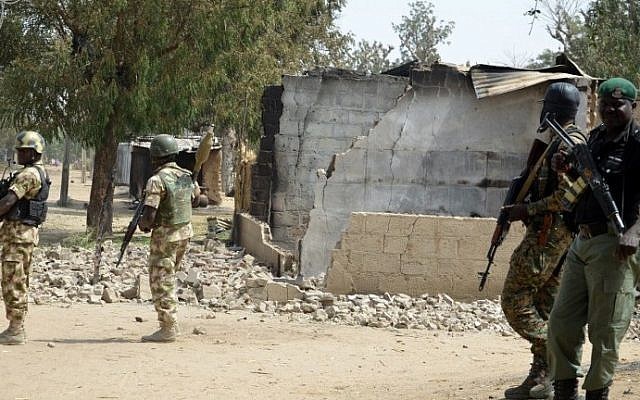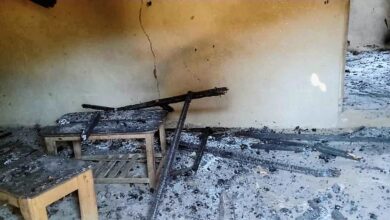More Attacks Feared As Insurgents Loot Borno Military Base, Kill 6 Soldiers
A fresh attack that left 69 persons dead took place in Gubio, Borno State, on Tuesday, three days after a raid on a military base underscore the increasing threats to civilians by state and non-state actors for alleged connivance.

Many fear that the raid of a military base in Auno, Borno State, last Saturday, might have empowered members of the Islamic State West Africa Province (ISWAP), a splinter group of Boko Haram, to subsequently carry out deadlier attacks.
The attack on troops over the weekend, which lasted two hours, led to the killing of at least six soldiers, AFP learnt. Many others sustained injuries and 45 soldiers are unaccounted for and thought to be missing.
The troops were forced to withdraw after they became overwhelmed, the news agency was told. Weapons at the base were looted and houses set ablaze by the insurgents before they were pushed out through airstrikes.
ISWAP terror group had laid siege in February this year on Auno, a village located about 24km to the west of Maiduguri, the Borno State capital.
Army got wind of attack three days prior
A source within the army told HumAngle that intelligence about the planned attack was received three days earlier and blamed troops along the Maiduguri-Damaturu Road for dragging their feet and reacting slowly to the information. The soldiers also received information pertaining to the movement of the insurgents as they approached the military base, the source added.
“It is so sad and unfortunate that even if you give them all the information, they will never act on it,” the source said.
He also explained that the primary motivation for the attack was logistical as ISWAP was in desperate need of fuel and foodstuff.
“They presently lack enough fuel to go for long-distance attacks due to the lockdown. It’s reported they had a bumper harvest from the attack; fuel, foodstuff and weapons from soldiers,” he said and added: “With the ‘resupply,’ few attacks may spring up within days and close vicinity.”
The boost from the looted materials, HumAngle gathered, made a second attack possible on Tuesday afternoon at Faduma Koloram, less than three hours away from the Auno military base.
The insurgents were not challenged during the attack and successfully carted away “large quantities of foodstuff and herds of cattle”. Reuters reported that at least 69 people were killed during the Tuesday attack and one village was razed.
“They arrived in vehicles and on motorcycles, shooting with AK-47s, razing the village and stealing 1,200 cattle and camels. A resident, a Civilian Joint Task Force (CJTF) member and a soldier each confirmed the same account,” the agency reported.
“They said the men attacked because they suspected residents of sharing information on Boko Haram’s movements with security authorities,” it added.
Nigeria’s Chief of Army Staff, Lt. Gen. Tukur Buratai, said on Monday that the military had neutralised in the last months up to 1,429 insurgents and had generally recorded “tremendous successes” in the fight against terrorism.
“This is a tremendous achievement, our intelligence corps along with the Department of State Services and of course our good friends the Civilian Joint Task Force (CJTF), have worked very hard to see that this is achieved and I assure you that things will continue to improve as the days go by,” he said.
Signals that civilians risk attacks
ISWAP was considered as ‘lenient to civilians’ when compared to their arch-rival, the Jama’tu Ahli Sunnah Lil Da’awatu Wal Jihad (JAS), led by Abubakar Shekau, but this seems to be changing.
“There are no much differences between the two factions, they are both ruthless,” said a vigilante involved in military operations against the groups in the past five years.
HumAngle gathered that ISWAP, a few weeks ago, read a riot act to ungoverned communities in Kukawa, Abadam and Marte local government areas in Borno State. Among the dos and don’ts spelt out by the Jihadists is mandatory Islamic education, congregational prayers, and every able male living in the Daula [Islamic State], must fight against the military.”
To make good their warning, they lined up many male youths and flogged them with horsewhips for providing information to the military, according to a source.
One of the victims that suffered 100 strokes and managed to escape to Maiduguri, whose name is withheld, told HumAngle that “this wasn’t the case in the past where we were allowed to live freely as civilians and taking care of our parents.”
Both the military and the insurgents in Lake Chad have accused civilians of colluding with the enemy, leading to collective punishments that have been documented over the years by human right groups.
Last Tuesday’s attack in Gubio and several others in the past, like the Auno attack that resulted in the deaths of scores of villagers and stranded commuters, bear the same hallmark.
Support Our Journalism
There are millions of ordinary people affected by conflict in Africa whose stories are missing in the mainstream media. HumAngle is determined to tell those challenging and under-reported stories, hoping that the people impacted by these conflicts will find the safety and security they deserve.
To ensure that we continue to provide public service coverage, we have a small favour to ask you. We want you to be part of our journalistic endeavour by contributing a token to us.
Your donation will further promote a robust, free, and independent media.
Donate Here




